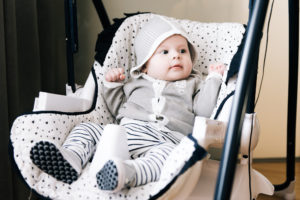When you buy through our links, we may earn a commission. Products or services may be offered by an affiliated entity. Learn more.
When Do Babies Sleep Through the Night
Ensuring infants go to sleep and stay asleep can be a challenge parents face. Many look forward to the time when their child will sleep through the night—but when exactly will that happen?
Most babies sleep through the night around 6 months. In one study, about 38% of 6-month-olds were not sleeping through the night, but that number dropped to less than 28% by 12 months. This is reflective of how the sleep cycles for babies change as they grow.
Newborns ages 0-3 months need 14–17 hours of sleep, and infants ages 4–11 months need between 12 and 15 hours. It is important to note that sleeping times vary greatly among babies under four months. Therefore, the American Academy of Pediatrics (AAP) and the American Association of Sleep Medicine (AASM) have not made a recommendation for that age group.
What Is ‘Sleeping Through the Night’?
When referring to infants, sleeping through the night means they sleep at least six uninterrupted hours. They may awake briefly, but are able to self-soothe and return to sleep.
What Can Affect When Babies Start To Sleep Through the Night?
While readiness to sleep through the night is linked to age, babies’ demeanors and experiences are unique resulting in varying sleep schedules.
Habits, such as a consistent bedtime routine, help support infants in sleeping through the night. As with children and adults, what happens during the daytime and in the hours before bedtime affects nighttime sleep for babies. For a regular bedtime routine with your baby consider the following:
- Dim bright lights and eliminate loud noises and activities before bedtime.
- Walk around holding your baby or rock gently to encourage sleepiness.
- Be sure to put your baby to bed while sleepy but not deeply asleep. This helps the baby learn how to go to sleep on their own.
Keep in mind that a good bedtime routine is important for overall sleep training. Bedtime routines are also good for parents, both during pregnancy and after to prevent or reduce parenthood insomnia.
Help Your Baby Sleep Better With Pediatric Sleep Coaching

our partner at sleepdoctor.com
Learn More“Life-changing! My anxiety about my son’s sleeping habits were immediately reduced after talking to Sara. She went above and beyond to tailor a schedule to our goals, answer our questions, keep us on track, and check in to encourage us when we just thought we couldn’t do it anymore.”
Rachael B. – Verified Customer
How Can Parents Help Their Babies Sleep Through the Night?
In addition to a consistent bedtime routine, two strategies have been demonstrated as effective in helping babies sleep uninterrupted during the night: bedtime fading and graduated extinction.
Bedtime fading is putting the baby to bed 15 minutes later each night to compress sleep and limit time in bed. If the parent checks on the baby 15 minutes after putting them to bed and they are asleep, bedtime no longer needs to be delayed.
Graduated extinction is the process of creating longer and longer gaps between when a baby cries and when the parent responds to the cry. The parent waits for two minutes after the baby first cries before responding, then waits four, and then six minutes after the next cries. These waiting periods are gradually extended over time until the baby has learned to self-soothe.
Not all strategies work for all babies. Consult your pediatrician for suggestions that are right for your child.
What Prevents Babies From Sleeping Through the Night?
There are several factors that prevent babies from sleeping through the night.
- Hunger. Since babies are accustomed to feeding a few times during the night, they may cry out for attention and feeding as they transition to sleeping for longer periods. At this stage, parents can keep the feeding interaction as brief as possible and not play with the baby.
- Separation anxiety. Babies naturally grow fearful of being away from their parents. If the baby cries after being put to bed, parental responses at night, such as cuddling and rocking, may cause the baby to seek parental attention. Parents should not remove the baby from their crib and instead touch the baby’s head or back and talk soothingly for reassurance until the baby has calmed down. This helps the baby learn their parents are nearby, and they will grow less frightened.
- Environment. Babies need to sleep in a dark room. If a parent comes to check on the baby during the night, they should not turn on any lights but use nightlights if necessary.
- Bed sharing. Having a baby sleep in the parents’ bed may hinder the baby’s ability to sleep through the night. It also puts the baby at an increased risk for sudden infant death syndrome (SIDS).
Should Parents Be Concerned if Their Babies Aren’t Sleeping at Night?
Some changes in a baby’s sleeping patterns are normal. Keep in mind that if there are brief changes, such as illness or traveling, sleeping may be more difficult for your child. Continue maintaining a consistent routine for the baby to encourage sleeping through the night.
If you are concerned about your baby’s sleeping habits, keep track of hours slept and when sleep occurs. Share this information with your pediatrician and they will be able to help identify whether or not your child’s behavior is normal or reflective of a possible sleeping problem.

Still have questions? Ask our community!
Join our Sleep Care Community — a trusted hub of sleep health professionals, product specialists, and people just like you. Whether you need expert sleep advice for your insomnia or you’re searching for the perfect mattress, we’ve got you covered. Get personalized guidance from the experts who know sleep best.
References
5 Sources
-
Pennestri, M. H., Laganière, C., Bouvette-Turcot, A. A., Pokhvisneva, I., Steiner, M., Meaney, M. J., Gaudreau, H., & Mavan Research Team (2018). Uninterrupted Infant Sleep, Development, and Maternal Mood. Pediatrics, 142(6), e20174330.
https://publications.aap.org/pediatrics/article/142/6/e20174330/37494/Uninterrupted-Infant-Sleep-Development-and -
Paruthi S, Brooks LJ, D’Ambrosio C, Hall WA, Kotagal S, Lloyd RM, Malow BA, Maski K, Nichols C, Quan SF, Rosen CL, Troester MM, Wise MS. Recommended Amount of Sleep for Pediatric Populations: A Consensus Statement of the American Academy of Sleep Medicine. J Clin Sleep Med. 2016 Jun 15;12(6):785-6.
https://pubmed.ncbi.nlm.nih.gov/27250809/ -
Gradisar, M., Jackson, K., Spurrier, N. J., Gibson, J., Whitham, J., Williams, A. S., Dolby, R., & Kennaway, D. J. (2016). Behavioral Interventions for Infant Sleep Problems: A Randomized Controlled Trial. Pediatrics, 137(6), e20151486.
https://publications.aap.org/pediatrics/article/137/6/e20151486/52401/Behavioral-Interventions-for-Infant-Sleep-Problems -
A.D.A.M. Medical Encyclopedia. (2018, October 11). Bedtime habits for infants and children., Retrieved December 9, 2020, from
https://medlineplus.gov/ency/article/002392.htm -
Consolini, D. M., (2019, September). Merck Manual Consumer Version: Sleeping in Newborns and Infants., Retrieved December 9, 2020, from
https://www.merckmanuals.com/home/children-s-health-issues/care-of-newborns-and-infants/sleeping-in-newborns-and-infants




























